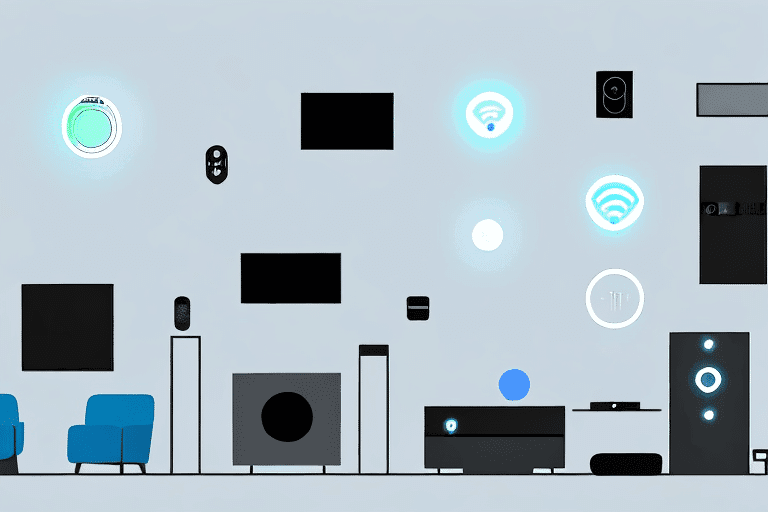UPDATED: March 17, 2024
Imagine walking into your home and having the lights automatically turn on, the temperature set to your perfect comfort level, and your favorite music playing in the background. Sounds like something out of a science fiction movie, right? Well, thanks to the wonders of smart home devices, this futuristic dream can now become a reality.
Understanding Smart Home Technology
The Concept of Smart Home Devices
At its core, smart home technology refers to the integration of various devices and systems in your home that can be controlled and automated using advanced technology. These devices are designed to make your life easier, more convenient, and more secure.
Imagine waking up to the gentle sound of your favorite music playing softly in the background, while the aroma of freshly brewed coffee wafts through your smart kitchen. As you step out of bed, the lights automatically adjust to your preferred brightness, and the thermostat sets itself to the perfect temperature. This is the beauty of smart home technology - a seamless and personalized experience tailored to your preferences.
The Role of Internet of Things (IoT) in Smart Homes
The Internet of Things (IoT) is the backbone of smart home technology. It enables the seamless communication and connection between different devices in your home. By connecting everyday objects to the internet, you can remotely control and monitor them using your smartphone or voice commands.
Through the power of IoT, your smart home becomes an interconnected ecosystem where your lights, appliances, security cameras, and even your pet feeder can communicate with each other to enhance your daily life. For example, your smart thermostat can learn your schedule and adjust the temperature accordingly, while your smart lights can mimic your presence when you're away to enhance security. The possibilities are endless with the integration of IoT in smart homes.
Types of Smart Home Devices
Smart Lighting Systems
Gone are the days when you had to manually switch on and off your lights. With smart lighting systems, you can control the brightness, color, and ambiance of your lights with a single tap on your smartphone. These devices also allow you to set schedules and create lighting scenes to suit your mood or activities.
Furthermore, smart lighting systems often come equipped with motion sensors that can detect when someone enters a room and automatically adjust the lighting to the desired level. This not only adds convenience but also helps save energy by ensuring that lights are only on when needed.
Smart Security Systems
When it comes to the safety and security of your home, smart security systems are a game-changer. From smart locks that let you control access to your home remotely to motion sensors and security cameras that send real-time alerts to your phone, these devices provide you with ultimate peace of mind.
In addition to the standard features, some advanced smart security systems offer facial recognition technology, allowing you to know exactly who is at your doorstep even before answering the doorbell. This level of sophistication not only enhances security but also adds a layer of convenience to your daily life.
Smart Thermostats and HVAC Systems
Gone are the days of manually adjusting your thermostat. Smart thermostats learn your preferences and automatically adjust the temperature to keep you comfortable while saving energy. They can also be controlled remotely, allowing you to adjust the temperature before you even step foot inside your home.
Moreover, some smart thermostats are equipped with geofencing technology, which detects when you are on your way home and adjusts the temperature accordingly, ensuring that you walk into a perfectly climate-controlled environment every time. This level of automation not only adds comfort but also contributes to energy efficiency.
Smart Home Entertainment Systems
Transform your living room into a home theater with smart home entertainment systems. From voice-controlled speakers that play music on demand to streaming devices that bring all your favorite shows and movies to your TV, these devices take your entertainment experience to the next level.
Furthermore, some smart home entertainment systems offer integration with virtual reality (VR) technology, allowing you to immerse yourself in a truly interactive and engaging entertainment experience. Whether you're watching a movie, playing a game, or listening to music, the seamless integration of VR technology can transport you to a whole new world without ever leaving your living room.
Benefits of Smart Home Devices
Energy Efficiency and Sustainability
One of the biggest advantages of smart home devices is their ability to promote energy efficiency and sustainability. Smart lighting systems, for example, use LED bulbs that consume less energy. These bulbs not only last longer than traditional incandescent bulbs but also emit less heat, reducing the load on your air conditioning system. Smart thermostats optimize your HVAC usage, resulting in significant energy savings by learning your schedule and adjusting the temperature accordingly. By reducing your carbon footprint, you not only save money on your utility bills but also contribute to a greener planet by conserving energy resources.
Furthermore, some smart home devices are equipped with energy monitoring features that provide real-time data on your energy consumption. This data allows you to identify areas where you can further reduce energy usage, empowering you to make informed decisions about your energy consumption habits.
Convenience and Comfort
Imagine arriving home after a long day at work and having your home automatically adjust to your preferred temperature, with soothing music playing softly in the background. Smart home devices provide unparalleled convenience and comfort by allowing you to create customized routines that cater to your lifestyle. From setting the perfect lighting for a cozy movie night to brewing your morning coffee as soon as you wake up, these devices streamline your daily activities and enhance your overall living experience.
Moreover, smart home assistants like Amazon Alexa and Google Assistant enable voice control functionality, allowing you to effortlessly manage your smart devices with simple voice commands. This hands-free approach not only adds a touch of futuristic sophistication to your home but also offers a seamless and intuitive way to interact with your devices.
Enhanced Security and Safety
Your home is your sanctuary, and smart home devices offer an extra layer of security and safety to protect it. With smart security systems, you can remotely monitor and control your home through connected cameras and sensors. These devices provide real-time alerts in case of suspicious activities, allowing you to take immediate action or notify authorities if necessary. Additionally, some smart locks offer keyless entry options, eliminating the risk of lost or stolen keys and providing a secure way to grant access to trusted individuals.
Furthermore, smart smoke detectors and carbon monoxide sensors can detect potential hazards and alert you to dangerous situations, even when you're away from home. By integrating these safety features into your smart home ecosystem, you can have peace of mind knowing that your home and loved ones are protected around the clock.
Choosing the Right Smart Home Devices
Compatibility with Existing Devices
Before diving into the world of smart home devices, it's crucial to ensure compatibility with your existing devices. Different brands may use different standards and protocols, so do your research and choose devices that seamlessly integrate with your current setup.
For example, if you already have a smart speaker from one brand, such as Amazon Echo, you'll want to ensure that any new smart home devices you purchase, like smart light bulbs or thermostats, are compatible with the Alexa voice assistant. This will allow you to control all your devices using a single interface, making your smart home experience more streamlined and convenient.
Ease of Installation and Use
Not everyone is tech-savvy, and that's perfectly fine. When selecting smart home devices, consider the installation process and ease of use. Look for devices that come with user-friendly interfaces and straightforward setup instructions to ensure a hassle-free experience.
Some smart home devices, like smart plugs or cameras, offer plug-and-play functionality, allowing you to simply plug them in and connect them to your home network without the need for complex configurations. This can be especially beneficial for those who are new to smart home technology and want a simple setup process.
Budget and Cost Considerations
Smart home devices come in various price ranges, so it's important to set a budget and prioritize your needs. While it can be tempting to splurge on the latest gadgets, it's essential to strike a balance between functionality, affordability, and long-term value.
Consider investing in smart home devices that offer energy-saving features, such as smart thermostats or lighting systems, which can help reduce your utility bills in the long run. Additionally, look for devices that receive regular software updates and have a good track record of customer support to ensure longevity and a positive user experience.
Future Trends in Smart Home Technology
Artificial Intelligence in Smart Homes
The future of smart home technology lies in the integration of artificial intelligence. Imagine a home that learns your habits, anticipates your needs, and proactively adjusts to create the perfect environment for you. With AI-powered devices, this futuristic dream is inching closer to reality.
Picture waking up to the sound of your favorite song playing softly in the background, as your smart home system analyzes your sleep patterns and gently wakes you up at the optimal time. As you make your way to the kitchen, your coffee machine starts brewing your preferred blend, perfectly timed to be ready when you reach the counter. These are just a few examples of how AI can transform our daily routines and make our lives more convenient and enjoyable.
The Role of 5G in Smart Home Development
As 5G technology continues to roll out globally, smart home devices will benefit from faster and more reliable connectivity. This means smoother streaming, quicker response times, and improved overall performance. The era of lag-free home automation is just around the corner.
Imagine controlling your entire home with just a few taps on your smartphone, no matter where you are. With 5G's low latency and high bandwidth, you can effortlessly adjust the temperature, turn on the lights, and even monitor your security cameras in real-time, all with minimal delay. This level of connectivity opens up a world of possibilities for smart home enthusiasts, making it easier than ever to stay connected and in control.
Privacy and Security Challenges in Smart Homes
While smart home devices offer a host of benefits, they also raise concerns about privacy and security. As the technology continues to evolve, it is crucial to prioritize data encryption, secure authentication, and regular software updates to safeguard against potential vulnerabilities.
Companies in the smart home industry are investing heavily in advanced security measures to ensure that your personal data remains protected. From end-to-end encryption to biometric authentication, these technologies are designed to give you peace of mind while enjoying the convenience and comfort of a smart home. It's important to stay informed about the latest security practices and choose devices from reputable manufacturers to mitigate any potential risks.
In conclusion, smart home devices are transforming the way we live, offering endless possibilities to enhance our living spaces with technology. From energy savings and convenience to security and personalization, these devices have the power to revolutionize the way we interact with our homes. As the future of smart home technology unfolds, it's important to embrace innovation while being mindful of privacy and security. So, go ahead, bring the future into your home, and experience the wonders of smart living.





